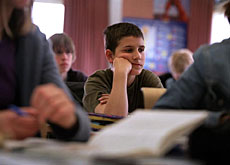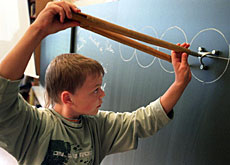Swiss better with numbers than words
Swiss adults score well in mathematics but have only average reading skills, according to an international survey published on Wednesday.
The study also showed that there has been a significant skill loss in adult populations in economically advanced countries.
The Adult Literacy and Life Skills (ALL) Survey compares literacy in six countries: Switzerland, Canada, United States, Norway, Italy and Bermuda, as well as the Mexican state of Nuevo Leon.
It measured skills in prose and document literacy, numeracy and problem solving.
The Federal Statistics Office said that although the Swiss came fourth in reading and comprehension skills they came first in mathematics and second in problem solving.
The study, coordinated by the OECD, is a follow-up to the International Adult Literacy Survey conducted in the 1990s.
The Statistics Office report said that “a significant percentage of the population do not have the basic skills to be fully-active members of modern society”.
It said that in many cases, the figure was almost 50 per cent.
Positive
On the positive side, the report found that there has been an improvement in the average skill level of the bottom five per cent of adults in all the countries surveyed.
The largest improvements in this area were observed in Switzerland and Norway, countries that have been targeting this group with public resources.
In all of the countries, the study found that literacy skills decline with age. About nine per cent of 16- to 25-year-olds in Switzerland have only rudimentary reading comprehension skills, compared with 21 per cent of 45- to 65-year-olds.
The report’s authors said this finding backed up the “use it or lose it” theory that skills have to be maintained through adult education.
Men vs women
Swiss men scored higher than women in each of the four categories, even though there was no appreciable difference between the sexes in the international Pisa study of 15-year-olds, released late last year.
Italy was the only other country revealing a similar trend.
“This finding comes as a surprise for which we don’t have an explanation,” Phillipe Hertig of the Statistics Office told swissinfo.
“The situation has not changed in that Swiss women are not as well represented as men in the working world, so there is a deficit here as far as equal opportunities are concerned,” Hertig reasoned.
The study also uncovered a clear trend in Switzerland, the US and Canada towards the selection of more educated immigrants.
Recently arrived immigrants performed almost as well as native-born residents in the tests, while immigrants who have lived longer than five years in their country of choice scored below average marks.
Hertig said the Swiss government had to improve efforts in this area to better integrate its long-term immigrant population.
swissinfo
The 2003 study was conducted in Switzerland, Canada, the United States, Norway, Italy, Bermuda and the Mexican state of Nuevo Leon.
In Switzerland, more than 5,000 people between the ages of 16 and 65 were tested.
The study is being expanded to include Hungary, the Netherlands, Australia, New Zealand and South Korea.

In compliance with the JTI standards
More: SWI swissinfo.ch certified by the Journalism Trust Initiative




You can find an overview of ongoing debates with our journalists here. Please join us!
If you want to start a conversation about a topic raised in this article or want to report factual errors, email us at english@swissinfo.ch.